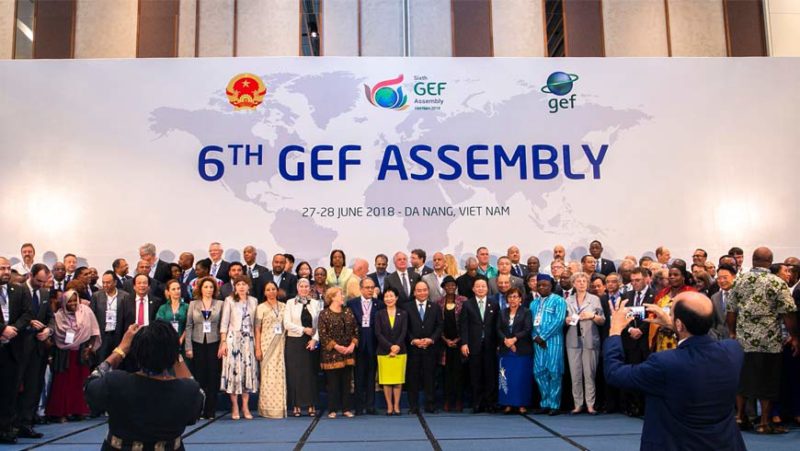From the clean-up of oil spill in Ogoniland in the polluted and restive Niger Delta region to the implementation of the Great Green Wall Initiative of restoring degraded desert-prone northern region as well as the execution of several erosion control and biodiversity conservation programmes, the Nigerian government believes it is on course in creating and sustaining an ideal environment to make life more meaningful for its over 180 million citizens.

Environment Minister of State, Ibrahim Usman Jibril, while addressing the 6th Assembly of the Global Environment Facility (GEF) on Thursday, June 28, 2018 in Da Nang, Vietnam, assured the international community of government’s unalloyed commitment towards the attainment of global objectives, especially as they concern the environment.
His words: “We are committed to the global efforts to achieve the Sustainable Development Goals (SDGs), low carbon economy, fight against climate change, desertification, erosion, biodiversity loss, and other forms of environmental pollution and degradation.
“Environmental problems come in various ways and forms. The food we eat, the air we breathe, the water we drink, and the land we till, are all prone to pollution and degradation when the carrying capacity of our ecosystem reaches a tipping point. Effects of this dislocation in equilibrium can be seen in increase in diseases, climate change, desertification, erosion, sprawling urban environmental problems, oil pollution, etc.”
Jibril spoke was during the last plenary, marking the closing ceremony of the Assembly. The heads of government delegations were seated in their different cubicles in alphabetical order and took turns to make their remarks.
Jibril explained that, beyond implementing and executing specific ecological projects that would help to reduce the devastating impacts of climate change on the Nigerian masses, government has gone into strategic partnerships with relevant stakeholders, particularly private sector investors to drive an ecologically-based economy.
“The Federal Government of Nigeria has put in place relevant institutional arrangements and mechanisms, including legal framework, to address various environmental problems facing our country.
“We are encouraging programmes and initiatives that will not only protect our environment but create wealth. Various pilot projects are being established in this regard.
“The Government has initiated the Extended Producer Responsibility (EPR) programme to encourage industry to shift to closed-cycle manufacturing and efficient take-back schemes for remanufacturing and recycling. This is in line with the tenets of green economy and circular economy in which the use of materials and generations of waste are minimised, and waste is recycled or reused as raw material, and any remaining waste treated in a way that causes minimal damage to the human health and the environment. The era of ‘cradle to grave’ in waste management is over. The new paradigm is ‘cradle to cradle’, meaning that every waste is a potential raw material for another product.
“We are strengthening our environmental institutions in order to improve environmental governance. We are providing enabling environment for private sector participation and partnership in environmental sustainability. We are promoting circular economy and clean technologies that will drive research, eco-innovation and actions in various areas, including climate change mitigation and adaption measures. We have initiated the Sovereign Green Bond to raise funds to address environmental problems,” the minister said.
On the Ogoniland clean-up, Jibril who vowed that no efforts would be spared in making sure that a thorough job is done, even as he disclosed that government expanded the scope of the project to include the comprehensive improvement of the welfare of the people of the Niger Delta, including providing them access to basic amenities such as medical services and portable water.
“Let me use this opportunity to reiterate government’s commitment to the clean-up of Ogoniland and the rest of Niger Delta in the South-South Zone of Nigeria following decades of negative environmental impacts due to oil exploration and exploitation activities. We have established the Hydrocarbon Pollution and Remediation Project (HYPREP), appointed a coordinator, and put in place a Governing Council (GC) and the Board of Trustees (BoT). In addition, free medical services and potable water are being provided to the communities. It is expected that the actual clean-up exercise will commence between August and September 2018 after the conclusion of the on-going procurement process.”
While commending the government of the Vietnam for the successful hosting of the 6th GEF Assembly, the minister underlined the commitment of the Nigerian government to the course of GEF, even as he expressed the country’s appreciation of the institution for its financial assistances over the years, while also calling for more funds to combat the large magnitude of environmental challenges confronting the country.
“I want to join other delegates in expressing our appreciation to the Government and people of Vietnam, our host country, for the warm reception and wonderful hospitality extended to us since our arrival in this beautiful city of Da Nang. We are truly impressed by the level of success in economic growth achieved by Vietnam, particularly over the past two decades. We commend the efforts of the government.
“Let me also thank the CEO of GEF and her team for their hard work and excellent organisation of this 6th GEF Assembly.
“Nigeria has been a strong ally/partner of GEF since inception of the organisation. We have been actively involved in GEF programmes and projects over the years. We thank GEF for its support to Nigeria in addressing environmental problems. Nigeria is a huge country with a lot of environmental challenges. We would therefore like to appeal to GEF for more support in addressing these environmental challenges. We would also like to request for increase in GEF grant to the West Africa Coastal Constituency of GEF, in which Nigeria belongs. There is need to address delays in project document preparation and submission to GEF from the region.
“Finally, as we enter into the new GEF cycle, we must all continue to work together as one entity of the global community to protect and preserve the global commons,” he added.
By Innocent Onoh in Da Nang, Vietnam
